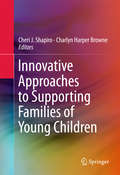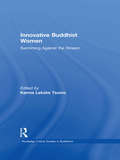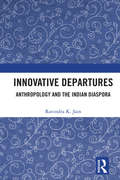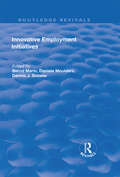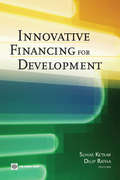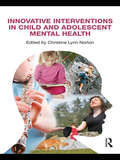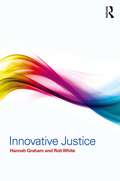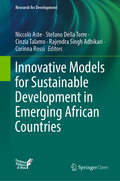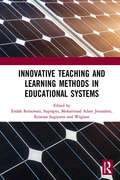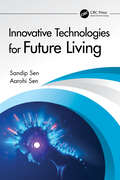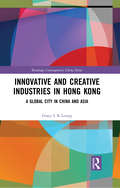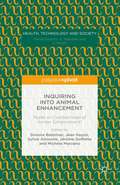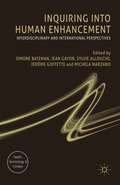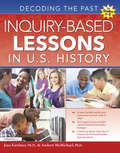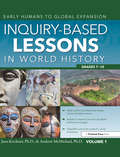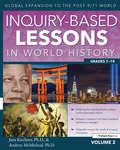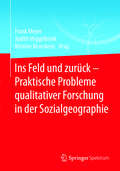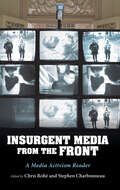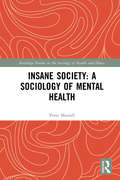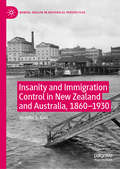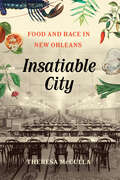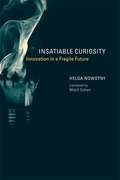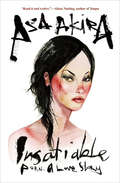- Table View
- List View
Innovative Approaches to Supporting Families of Young Children
by Cheri J. Shapiro Charlyn Harper BrowneThis invaluable reference introduces successful strengths-based programs for aiding families of young children in critical social contexts: family, school, community, and policy. The wide range of systems/contextual approaches described here are based in current understanding of children's development, stress and resilience in families, cultural competence, and the two-generational approach to intervention. Research-based examples across early care and early learning platforms illustrate the links between parental protective factors and children's academic and social outcomes, and between family stability and larger social goals. By supporting parents and children equally, the contributors assert, these interventions more fully address developmental and family issues than programs that mainly serve one generation or the other. Included in the coverage: * Parent and community focused approaches to supporting parents of young children: the Family Networks Project. * Honoring parenting values, expectations, and approaches across cultures. * Building young children's executive functions at home and in early care and education settings. * Promoting early childhood development in the pediatric medical home. * Neighborhood approaches to supporting families of young children. * Public policy strategies to promote the well-being of families with young children. Innovative Approaches for Supporting Parents of Young Children benefits professionals and practitioners working to support families of young children, particularly those interested in social work, psychology, public policy, and public health.
Innovative Buddhist Women: Swimming Against the Stream (Routledge Critical Studies in Buddhism #Vol. 15)
by Karma Lekshe TsomoCombines the voices of scholars and practitioners in analysing Buddhist women's history. 26 articles document the lives of women who have set in motion changes within Buddhist societies, with analyses of issues such as gender, ethnicity, authority, and class that affect the lives of women in traditional Buddhist cultures and, increasingly, the west.
Innovative Departures: Anthropology and the Indian Diaspora
by Ravindra K. JainThis volume brings together analytical insights from modern social and cultural anthropology to unravel processes of globalization in the 21st century through diasporic migrations. Developments in anthropological theory and method are traced from the heritage of Enlightenment to the present times, with special reference to India. While firmly anchored in the local experience, the narrative of diasporic migrations presented in this book ranges widely to cover comparisons across the world and is informed by an interdisciplinary focus. The author deals with the issues of ethnicity, identity and modernity in a transnational and geopolitical context. The innovative and multi-dimensional thrust encompasses major themes and research methodology. The work includes important case studies and a detailed empirical exploration of the multicultural societies of Malaysia and South Africa. Authoritative and accessible, this book will be essential reading in contemporary anthropology, especially for scholars and researchers of sociology, social and cultural anthropology, diaspora and migration studies, ethnic studies and cultural studies as also international relations, foreign affairs, public policy, think-tanks and government bodies.
Innovative Employment Initiatives (Routledge Revivals)
by Bernd MarinThis title was first published in 2000. The result of an international meeting organized by the European Centre, this book reports from economists, social scientists and experts from government and inter-governmental institutions who came together to investigate the best way to overcome mass unemployment in Europe.
Innovative Financing for Development
by Dilip Ratha Suhas KetkarDeveloping countries need additional, cross-border capital channeled into their private sectors to generate employment and growth, reduce poverty, and meet the other Millennium Development Goals. Innovative financing mechanisms are necessary to make this happen. 'Innovative Financing for Development' is the first book on this subject that uses a market-based approach. It compiles pioneering methods of raising development finance including securitization of future flow receivables, diaspora bonds, and GDP-indexed bonds. It also highlights the role of shadow sovereign ratings in facilitating access to international capital markets. It argues that poor countries, especially those in Sub-Saharan Africa, can potentially raise tens of billions of dollars annually through these instruments. The chapters in the book focus on the structures of the various innovative financing mechanisms, their track records and potential for tapping international capital markets, the constraints limiting their use, and policy measures that governments and international institutions can implement to alleviate these constraints.
Innovative Interventions in Child and Adolescent Mental Health
by Christine Lynn NortonInnovative Interventions in Child and Adolescent Mental Health is a unique composite of the literature on various innovative interventions for children and adolescents, and provides a developmental and neurobiological rationale for utilizing innovative interventions with this population. Based on the latest research, this book emphasizes that children and adolescents need more than just talk therapy. These innovative interventions can be applied in a variety of practice settings including schools, juvenile justice, community-based counseling centers, and residential treatment. This book bridges the gap between theory and practice, and provides a historical, theoretical, and research-based rationale, as well as a helpful case study, for each type of intervention being discussed.
Innovative Justice
by Rob White Hannah GrahamThis book showcases innovative justice initiatives from around the world which engage offenders, practitioners and communities to reduce reoffending and support desistance and positive change. It is groundbreaking in bringing together inspiring ideas and pioneering practices to analyse how ‘justice done differently’ is making a difference. The voices and experiences of the people at the forefront of these innovative initiatives are presented throughout the book, including offenders, corrections staff and directors, the judiciary, scientists and academics, volunteers and community organisations. Strengths-based research methods are used to investigate and celebrate best practices and ‘good news stories’ from the field. The authors raise critical questions about what is considered innovative and effective, for whom and in what context, presenting their own conceptual approach for analysing innovation. With initiatives drawn from diverse jurisdictions and cultures – including the UK, Europe, Australia, Asia, the US and South America – this book showcases original ideas and refreshing developments that have the potential to transform rehabilitation and reintegration practices. The book’s substance and style will resonate with practitioners, students and academics across the interdisciplinary fields of criminology and criminal justice.
Innovative Models for Sustainable Development in Emerging African Countries (Research for Development)
by Corinna Rossi Cinzia Talamo Stefano Della Torre Niccolò Aste Rajendra Singh AdhikariThis open access book explores key issues and presents recent case studies in areas of importance for the transition to a circular model of development in emerging African countries that will minimize resource consumption and waste production. The topics covered include the development of sustainable housing models, energy and environmental issues in building design and technical systems, recycling for a sustainable future, models for humanitarian emergencies, and low-cost and web-based digital tools with applications in architecture and archaeology. The aim is to contribute to a necessary paradigm shift with respect to urban planning and usage of territories, moving from a linear urban metabolism based on the “take, make, dispose” approach to a circular metabolism. Such a change requires a focus on the relationship between the architectural, urban, and physical aspects of new developments, climate, and energy demand, as well as the identification and integration of strategies and infrastructures to achieve a high level of efficiency and self-sufficiency. The book will appeal to all with an interest in sustainable development in the African context.
Innovative Teaching and Learning Methods in Educational Systems: Proceedings of the International Conference on Teacher Education and Professional Development (INCOTEPD 2018), October 28, 2018, Yogyakarta, Indonesia
by Kristian Sugiyarto Suprapto Endah Retnowati Jerusalem Mohammad Adam WagironThis proceedings volume of InCoTEPD 2018 covers many ideas for handling a wide variety of challenging issues in the field of education. The outstanding ideas dealing with these issues result in innovation of the system. There are many innovation strategies resulting from recent research that are discussed in this book. These strategies will become the best starting points to solve current and future problems.This book provides an in-depth coverage of educational innovation developments with an emphasis on educational systems, formal or informal education strategies, learning models, and professional teachers. Indeed, those developments are very important to be explored for obtaining the right way of problem-solving.Providing many ideas from the theoretical foundation into the practice, this book is versatile and well organized for an appropriate audience in the field of education. It is an extremely useful reference for students, teachers, professors, practitioners, and government representatives in many countries.
Innovative Technologies for Future Living
by Sandip Sen Aarohi SenAs of January 2023, there are 5 billion users of the internet. People who use technology and want to know about it—in simple language, without jargon. Many of those nurture dreams and aspirations to be quicker, smarter and ‘be the change.’ We bring to them relatable stories of everyday users, understood by consumers and gadget freaks alike. We start with the Internet of Things (IoT) and show how consumers are using smart devices that teach them to manage their homes, travel and lifestyle through their smartphones. We see how cloud computing and artificial intelligence (AI) are enabling them to give feedback to IoT devices, and extracting multiple services from household products like the humble LED light, or the refrigerator, or sophisticated jet engines, or combined harvesters. As devices turn smart and AI and robots enter our workspace they run the risk of being hacked. So techies developed the Blockchain, with encrypted text that would secure digital assets. But with it arrived cryptocurrencies that threaten to bring unprecedented speculation, money laundering and cyber crimes. We also explore new opportunities in telehealth, distant education and metaworld, and the strides made in digital transformation that has, in less than five years, empowered over 2 billion people across the world, giving them access to cost effective banking, education, travel, energy, food and health services. But the same technologies are used to fight wars and disrupt supply chains that cause acute distress and worldwide recessions. The book is relevant because the changes happening now are not incremental but tectonic. This opens the door to a future that is more fascinating and threatening than fiction. Read on to find out more.
Innovative and Creative Industries in Hong Kong: A Global City in China and Asia (Routledge Contemporary China Series)
by Grace L LeungThe experience of Hong Kong’s innovative and creative industries and the challenges they face serves as an important case study for other Chinese and Asian cities that are actively developing their innovative and creative industries in the era of globalization. The return of sovereignty over Hong Kong back to China in 1997 has led to both collaboration and competition between the two places in innovative and creative sectors for the Greater China and Asian Regions. Hong Kong has remained unique in spite of the integration, but she has to strike a delicate balance between being simultaneously a Chinese and an international city. This book looks at different innovative and creative industries, such as international art and culture exhibition, innovative technology, digital entertainment, TV and movies, as well as government policy for innovative and creative industries, particularly the changing competitive landscape brought about by the latest Great Bay Area development. Drawing insights from cultural history, innovation economics, cultural policy studies, and cultural geography, this book explores the opportunities and challenges of Hong Kong's innovative and creative industries, in particular after the change of sovereignty in 1997. It demonstrates that the city’s legacy, and heavy government input in capital, do not guarantee their sustainable development. This is a book not only for policymakers or academics interested in innovative and creative industries but also to students contemplating a career in these areas in Hong Kong, the Greater China and the Asian Region.
Inquiring into Animal Enhancement: Model or Countermodel of Human Enhancement? (Health, Technology and Society)
by Jean Gayon Simone Bateman Sylvie Allouche Jérôme Goffette Michela MarzanoThis book explores issues raised by past and present practices of animal enhancement in terms of their means and their goals, clarifies conceptual issues and identifies lessons that can be learned about enhancement practices, as they concern both animals and humans.
Inquiring into Human Enhancement: Interdisciplinary and International Perspectives (Health, Technology and Society)
by Jean Gayon Sylvie Allouche Jérôme Goffette Michela MarzanoHuman enhancement has become a major concern in debates about the future of contemporary societies. This interdisciplinary book is devoted to clarifying the underlying ambiguities of these debates, and to proposing novel ways of exploring what human enhancement means and understanding what practices, goals and justifications it entails.
Inquiry-Based Lessons in U.S. History: Decoding the Past (Grades 5-8)
by Jana Kirchner Andrew McMichaelInquiry-Based Lessons in U.S. History: Decoding the Past provides primary source lessons that focus on teaching U.S. history through inquiry to middle school students. Students will be faced with a question to answer or problem to solve and will examine primary sources for evidence to create hypothetical solutions. The chapters focus on key chronological periods (e.g., the Age of Exploration to the Civil Rights era) and follow the scope and sequence of major social studies textbooks, with activities linked to the U.S. History Content Standards and the Common Core State Standards for Literacy in History/Social Studies. The three lesson plans in each chapter begin with an essential question that sets the focus for the primary sources and teaching strategies that follow. The lesson plans include differing types of primary sources such as photographs, speeches, political cartoons, historic maps, paintings, letters, and diary entries.Grades 5-8
Inquiry-Based Lessons in World History: Early Humans to Global Expansion (Vol. 1, Grades 7-10)
by Jana Kirchner Andrew McMichaelSpanning the time period from 15,000 BCE to 1500 CE, Inquiry-Based Lessons in World History (Vol. 1) focuses on creating global connections between people and places using primary sources in standards-based lessons. With sections on early humans, the ancient world, classical antiquity, and the world in transition, this book provides teachers with inquiry-based, ready-to-use lessons that can be adapted to any classroom and that encourage students to take part in the learning process by reading and thinking like historians. Each section contains chapters that correspond to the scope and sequence of most world history textbooks. Each inquiry lesson begins with an essential question and connections to content and literacy standards, followed by primary source excerpts or links to those sources. Lessons include step-by-step directions, incorporate a variety of literacy strategies, and require students to make a hypothesis using evidence from the texts they have read. Grades 7-10
Inquiry-Based Lessons in World History: Global Expansion to the Post-9/11 World (Vol. 2, Grades 7-10)
by Jana Kirchner Andrew McMichaelSpanning the time period from 750 CE to the present day, Inquiry-Based Lessons in World History (Vol. 2) focuses on creating global connections between people and places using primary sources in standards-based lessons. With sections on the world in transition, the era of revolutions, imperialism and global war, and the modern world, this book provides teachers with inquiry-based, ready-to-use lessons that can be adapted to any classroom and that encourage students to take part in the learning process by reading and thinking like historians. Each section contains chapters that correspond to the scope and sequence of most world history textbooks. Each inquiry lesson begins with an essential question and connections to content and literacy standards, followed by primary source excerpts or links to those sources. Lessons include step-by-step directions, incorporate a variety of literacy strategies, and require students to make a hypothesis using evidence from the texts they have read. Grades 7-10
Ins Feld und zurück - Praktische Probleme qualitativer Forschung in der Sozialgeographie
by Frank Meyer Judith Miggelbrink Kristine BeurskensIn diesem Buch berichten 20 Wissenschaftler/innen aus ihren praktischen Erfahrungen in der Feldforschung im Bereich der Sozialgeographie. Im Einzelnen gehen sie auf die Herausforderungen bei der Konzeption, im Prozess der Durchführung und im Nachgang von Datenerhebungen ein. Sie diskutieren zeitliche, inhaltliche und organisatorische Aspekte und beleuchten, wie Entscheidungen im Feld Erfolg und Misserfolg von Forschung maßgeblich prägen. Ihre Erlebnisse an diversen Orten wie Mittel- und Osteuropa, den Steppen Kasachstans sowie in schrumpfenden Regionen oder in ostdeutschen Jugendklubs bilden die Grundlage für Reflexionen über schwierige Entscheidungen im Feld. Zudem diskutieren sie den Umgang mit sich ändernden Forschungsfragen, widerspenstigen Journalist/inn/en und aufkommenden Shitstorms. Das Buch richtet sich an Nachwuchswissenschaftler/innen, die im Vorfeld ihrer ersten Feldforschungen mit Problemen konfrontiert werden, die zumeist von Methodenhandbüchern nicht berücksichtigt werden.
InsUrgent Media from the Front: A Media Activism Reader
by Chris Robé and Stephen CharbonneauIn the 1940s, it was 16 mm film. In the 1980s, it was handheld video cameras. Today, it is cell phones and social media. Activists have always found ways to use the media du jour for quick and widespread distribution.InsUrgent Media from the Front takes a look at activist media practices in the 21st century and sheds light on what it means to enact change using different media of the past and present. Chris Robé and Stephen Charbonneau's edited collection uses the term "insUrgent media" to highlight the ways grassroots media activists challenged and are challenging hegemonic norms like colonialism, patriarchy, imperialism, classism, and heteronormativity. Additionally, the term is used to convey the sense of urgency that defines media activism. Unlike slower traditional media, activist media has historically sacrificed aesthetics for immediacy. Consequently, this "run and gun" method of capturing content has shaped the way activist media looks throughout history.With chapters focused on indigenous resistance, community media, and the use of media as activism throughout US history, InsUrgent Media from the Front emphasizes the wide reach media activism has had over time. Visibility is not enough when it comes to media activism, and the contributors provide examples of how to refocus the field not only to be an activist but to study activism as well.
Insane Society: A Sociology of Mental Health
by Peter MorrallThis book critiques the connection between Western society and madness, scrutinizing if and how societal insanity affects the cause, construction, and consequence of madness. Looking beyond the affected individual to their social, political, economic, ecological, and cultural context, this book examines whether society itself, and its institutions, divisions, practices, and values, is mad. That society’s insanity is relevant to the sanity and insanity of its citizens has been argued by Fromm in The Sane Society, but also by a host of sociologists, social thinkers, epidemiologists and biologists. This book builds on classic texts such as Foucault’s History of Madness, Scull’s Marxist-oriented works and more recent publications which have arisen from a range of socio-political and patient-orientated movements. Chapters in this book draw on biology, psychology, sociological and anthropological thinking that argues that where madness is concerned, society matters. Providing an extended case study of how the sociological imagination should operate in a contemporary setting, this book draws on genetics, neuroscience, cognitive science, radical psychology, and evolutionary psychology/psychiatry. It is an important read for students and scholars of sociology, anthropology, social policy, criminology, health, and mental health.
Insane: America's Criminal Treatment of Mental Illness
by Alisa RothAn urgent exposé of the mental health crisis in our courts, jails, and prisonsAmerica has made mental illness a crime. Jails in New York, Los Angeles, and Chicago each house more people with mental illnesses than any hospital. As many as half of all people in America's jails and prisons have a psychiatric disorder. One in four fatal police shootings involves a person with such disorders.In this revelatory book, journalist Alisa Roth goes deep inside the criminal justice system to show how and why it has become a warehouse where inmates are denied proper treatment, abused, and punished in ways that make them sicker.Through intimate stories of people in the system and those trying to fix it, Roth reveals the hidden forces behind this crisis and suggests how a fairer and more humane approach might look. Insane is a galvanizing wake-up call for criminal justice reformers and anyone concerned about the plight of our most vulnerable.
Insanity and Immigration Control in New Zealand and Australia, 1860–1930 (Mental Health in Historical Perspective)
by Jennifer S. KainThis book examines the policy and practice of the insanity clauses within the immigration controls of New Zealand and the Commonwealth of Australia. It reveals those charged with operating the legislation to be non-psychiatric gatekeepers who struggled to match its intent. Regardless of the evolution in language and the location at which a migrant’s mental suitability was assessed, those with ‘inherent mental defects’ and ‘transient insanity’ gained access to these regions. This book accounts for the increased attempts to medicalise border control in response to the widening scope of terminology used for mental illnesses, disabilities and dysfunctions. Such attempts co-existed with the promotion of these regions as ‘invalids’ paradises’ by governments, shipping companies, and non-asylum doctors. Using a bureaucratic lens, this book exposes these paradoxes, and the failings within these nineteenth- and early twentieth-century Australasian nation-state building exercises.
Insanity and Sanctity in Byzantium
by Youval RotmanIn the Roman and Byzantine Near East, the holy fool emerged in Christianity as a way of describing individuals whose apparent madness allowed them to achieve a higher level of spirituality. Youval Rotman examines how the figure of the mad saint or mystic was used as a means of individual and collective transformation prior to the rise is Islam.
Insatiable City: Food and Race in New Orleans
by Theresa McCullaA history of food in the Crescent City that explores race, power, social status, and labor. In Insatiable City, Theresa McCulla probes the overt and covert ways that the production of food and the discourse about it both created and reinforced many strains of inequality in New Orleans, a city significantly defined by its foodways. Tracking the city’s economy from nineteenth-century chattel slavery to twentieth-century tourism, McCulla uses menus, cookbooks, newspapers, postcards, photography, and other material culture to limn the interplay among the production and reception of food, the inscription and reiteration of racial hierarchies, and the constant diminishment and exploitation of working-class people. The consumption of food and people, she shows, was mutually reinforced and deeply intertwined. Yet she also details how enslaved and free people of color in New Orleans used food and drink to carve paths of mobility, stability, autonomy, freedom, profit, and joy. A story of pain and pleasure, labor and leisure, Insatiable City goes far beyond the task of tracing New Orleans's culinary history to focus on how food suffuses culture and our understandings and constructions of race and power.
Insatiable: Porn–A Love Story
by Asa AkiraA “hot, hilarious, and engrossing” porn star memoir. “Akira is the Galileo of women’s sexuality” (Alissa Nutting, author of Unclean Jobs for Women and Girls). After earning a good living by stripping and working as a dominatrix at a sex dungeon, Asa Akira built up a reputation for being one of the most popular, hardworking, and extreme actors in the porn business, winning dozens of awards for her 330+ movies, including her #1 bestselling series “Asa Akira Is Insatiable.” In Insatiable, Akira recounts her extraordinary life in chapters that are hilarious, shocking, and touching. In a wry, conversational tone, she talks about her experiences shoplifting and doing drugs while in school, her relationship with other porn stars (she is married to one) and with the industry at large, and her beliefs about women and sexuality. Insatiable is filled with Akira’s unusual and often highly amusing anecdotes, including her visit to a New Hampshire sex shop run by a mother and son. One of very few articulate voices writing from the inside, Akira has something important, controversial, and astonishingly interesting to say about sex and its central role in our lives and culture. “Akira is not only passionate about the porn industry, she is shameless, funny and even endearing.” —Susannah Cahalan, New York Post, Best Books of the Year “Each chapter is filled with brutal honesty and self-deprecating humor. It’s touching, inspiring, and flies in the face of a lot of people’s preconceptions about the life of an adult film star.” —Vice “Her book is a lot like her porn: raw, brutal and always unflinching.” —Salon.com
